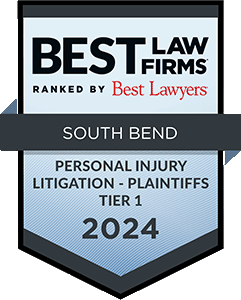 A recent report found that collisions involving the transportation of hazardous materials have been on the rise for the last decade. According to the report, data from the Department of Transportation’s Pipeline and Hazardous Materials Safety Administration (PHMSA) shows a 155 percent increase in big rig collisions involving hazardous materials between 2013 and 2023.
A recent report found that collisions involving the transportation of hazardous materials have been on the rise for the last decade. According to the report, data from the Department of Transportation’s Pipeline and Hazardous Materials Safety Administration (PHMSA) shows a 155 percent increase in big rig collisions involving hazardous materials between 2013 and 2023.
Victims of hazmat truck accidents may be wondering what their legal options may be for pursuing compensation for their damages. Our South Bend car crash lawyers are prepared to discuss your claim during a free consultation.
Below, we discuss the dangers of hazmat collisions and who may be liable for your damages.
What is Considered a Hazardous Material?
Hazardous materials are items or agents that can cause harm to humans, animals or the environment. These materials can be chemical, radiological, biological or physical.
The Department of Transportation breaks down hazardous materials into nine classes. They are as follows:
Explosives
An explosive is any reactive substance that contains a great amount of potential energy that can produce an explosion if released suddenly. Detonating devices and blasting agents are also included in this category of hazardous materials.
Gasses
Hazmat gases are defined as gases that are sufficiently toxic and/or reactive. They are classified as flammable, non-flammable or toxic.
Flammable Liquids
These are any liquids that may easily catch fire, including gasoline, diesel fuel, jet fuel, motor oil, kerosene and ethanol.
Flammable Solids and Spontaneously Combustible Materials
Any non-liquid material that may easily catch fire, including sulfur, activated charcoal, aluminum powder, magnesium and household items like matches.
Oxidizers and Organic Peroxides
Any chemical compound that can cause or enhance the burning of another material is considered an oxidizing agent.
Toxic Materials and Infectious Substances
Things like poisons that are not gases and infectious biological materials are included in this category. For example, rat poison and used medical equipment like syringes.
Radioactive Materials
This class is labeled as such due to the instability in the atom of the material. Some common household items that may contain radioactive material include camera lenses, cat litter, ceramics, cigarettes, fertilizer, fluorescent lightbulbs, granite countertops and other building products.
Corrosive Materials
Strong acids that can burn away material fall into this category. For example, nitric acid, chromic acid and sulfuric acid.
Miscellaneous Dangerous Materials
This category is for any other dangerous substances that poses a threat to humans, animals or environmental health, but do not fall under any of these other categories.
Is Any Vehicle Authorized to Carry Hazardous Materials?
Not every vehicle is legally authorized to carry hazardous materials. There are certain state and federal regulations drivers must adhere to.
What Are the Federal Regulations?
Under federal law, anyone transporting hazardous materials must be trained on how the material is to be transported and how to respond if there is an emergency.
Not every driver with a Commercial Driver’s License (CDL) is eligible for transporting hazardous materials. Only CDL holders with a Hazmat endorsement may transport hazardous materials. To obtain, and maintain, this special license, truck drivers must undergo additional training.
According to the Federal Motor Carrier Safety Administration (FMCSA), the required training includes the following:
- General awareness/familiarization with hazardous materials regulations.
- Function-specific training to teach the necessary knowledge and skills for the individual’s job function.
- Safety training on the risks of exposure to hazardous materials and what personal protective equipment is needed when handling the materials.
- Security training for the safety risks while transporting hazardous materials, such as gasoline and diesel fuel.
Drivers transporting hazardous materials must also undergo recurrent training to stay up to date on the latest information.
What Are the State Regulations?
In Indiana, drivers with a CDL must also get a Hazmat Endorsement on their licenses. To do so, these drivers must do the following:
- Complete the HazMat application through Indiana Bureau of Motor Vehicles (BMV) or Transportation Security Administration (TSA)
- Pass the BMV exam
- Undergo a TSA background check
- Complete a medical screening
- Submit a TSA background security screening
Who May Be Liable for a Hazardous Materials Accident?
Due to the heavy restrictions around the transportation of hazardous materials, there may be more than one party you can sue if you are injured in a hazmat collision.
The party who is most likely liable is the driver of the vehicle that caused the collision. If he or she is an independent contractor or owns the truck, then you may be able to pursue compensation from that individual’s liability insurance.
However, if the driver works for a company, like a gas company for transporting diesel fuel, then you may be able to pursue compensation from the driver’s employer.
Liability is just one of the many issues that make these claims complicated. That is why victims of hazmat accidents need an experienced lawyer with the resources to gather evidence and build a strong case.
Injuries from these accidents are often severe, requiring significant medical care. Victims may need care for the rest of their lives, as they may be permanently disabled. That is why you need a lawyer with significant experience in obtaining full compensation for those injured in vehicle crashes.
Insurance companies and other liable parties are going to fight hard to avoid accountability. Your lawyer needs to be an experienced negotiator who is prepared to go to court. When lawyers are not prepared to go to court, liable parties know it, and they may be less likely to offer full compensation.
Need Help After a Hazmat Crash? Call Us Today
If you were injured in a hazmat collision and need help filing a claim, call our experienced attorneys today. We offer a free consultation to discuss your legal options.
There are no upfront fees if we take on your case.
Call (574) 444-0741 today.











